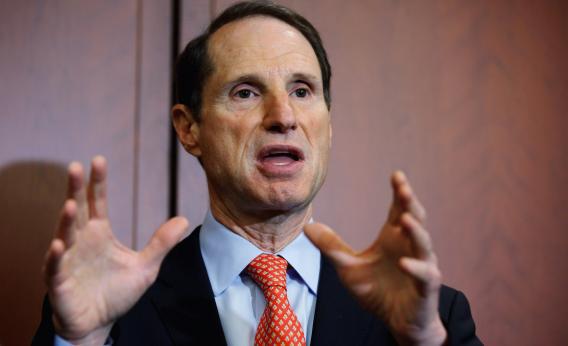The Obama White House thinks that the public is overreacting to recent leaks about NSA surveillance. But Sen. Ron Wyden, D-Ore., isn’t tempering his language. On Tuesday, Wyden spoke about domestic data collection and privacy rights at the Center for American Progress Action Fund. Spurred on by the recent leaks that reveal the extent of the NSA’s surveillance capabilities, Wyden delivered a comprehensive and damning speech (full text here). He warned about the corrosive pathway America is going down, stating, “The government’s authority to collect information on law-abiding American citizens is essentially limitless.”
Wyden has long been a defender of privacy and civil liberties. Two years ago, he attempted to warn people about the secret interpretations of the Patriot Act, which, as we now know, have created a set of different rulings that have greatly empowered the NSA spy machine. As Wyden put it in his speech, there’s the version of the Patriot Act that you can look up online, read, and analyze. And then “there’s the real Patriot Act—the secret interpretation of the law that the government is actually relying upon.”
Without protective legislation, says Wyden, the government may and can treat our cellphones as a “combination phone bug, listening device, location tracker, and hidden camera.” As of yet, there haven’t been any leaks revealing whether the NSA is collecting location data from cellphones. But “if local law enforcement is getting location data, then you can bet that NSA is getting it too,” Chris Soghoian, the ACLU’s principal technologist and senior policy analyst for the Speech, Privacy, and Technology Project, told me. Experts have raised the flag for years now about the ways that location data could be collected under the Patriot Act. And, in fact, a report on Monday described how cellphones can be tracked even when they’re off by using a technique called “The Find” that likely uses spyware to infect target phones. The rules for handling classified information prevent Wyden from sharing specifics, but it seems that he’s going as far up to that line as he can.
With as much as we now know about the government’s surveillance operations, we shouldn’t be surprised that there’s still more to learn—and that the worse may be yet to come. During the Q-and-A session after Wyden’s prepared remarks, a member of the audience revealed that a footnote from an official Department of Homeland Security memo on privacy flies in the face of fundamental American principles: “The Privacy Office has not adopted the notion of balancing privacy against other values because that paradigm results in a zero-sum outcome and privacy often is diminished at the expense of security.” Not only is this inconsistent with research and scholarship, it is also a dangerous precedent to set.
The time is now to enact democracy-preserving changes. “If we do not seize this unique moment in our constitutional history to reform our surveillance laws and practices, we are all going to live to regret it,” Wyden said. “The combination of increasingly advanced technology with a breakdown in the checks and balances that limit government action could lead us to a surveillance state that cannot be reversed.”
